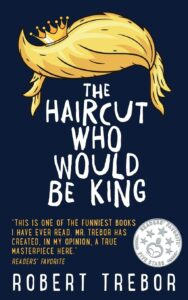This is a satirical portrayal of Donald Trump’s ascent to power and his unconventional alliance with Vladimir Putin. Trump, depicted as egotistical and emotionally stunted since childhood, transitions from real estate to reality TV before entering politics. He recruits shock jock Alex Clamz for his presidential campaign, facing off against the sensible Mallory Claxton. Despite scandal and controversy, Trump wins the presidency with covert support from Putin. The narrative humorously highlights their contrasting personalities, with Putin portrayed as a former KGB agent with unique coping mechanisms. The story unfolds with absurdity and farce, reflecting on contemporary political dynamics through a comedic lens.
- “Can you discuss any challenges you faced in transitioning from the world of acting to becoming a writer?”
The question is misdirected. I have NOT transitioned from acting into writing. I am still very much an actor, perhaps more on stage than on film. A wonderful role I recently played was Amnon Weinstein in the play Stories From The Violins of Hope, about a heroic Israeli violinmaker, who helped rescue and restore violins from the Holocaust. Though the victims were dead, their violins “spoke” for them. As I answered earlier, I’ve ALWAYS been a writer. Perhaps I’m writing more now, because acting roles of substance are getting fewer. But I’m grateful I had so many of those roles in the past, because they provide a nice pension for me.
2. How does your experience in acting influence your approach to storytelling and character development in your writing?
The focus in both arts is on telling the story, as fully and with as much dimension as possible. When I’m acting, I’m speaking someone else’s lines. But I must make them “mine” so the audience believes I’m thinking them and acting on them. And there comes a point in the film or play where I am involved more deeply the character than either the writer or director, and I will occasionally ask if I can change some lines. An example: In the film Talk Radio directed by Oliver Stone and written by Eric Bogosian, there is a scene where I invite Eric’s character (Barry) onto my top-rated radio show, and he mocks and humiliates me. As written, a commercial comes on, and I plead with Barry not to make fun of me or my show. That made no sense to me. My character might be a nice guy, but you don’t mess around with a person’s livelihood. Oliver and Eric asked what I wanted to do. They agreed with my choice, which you see in the film, to slap the microphone out of Barry’s hand, and almost shout, “WHEN I SAY CUT, YOU STOP TALKING!”
Although The Haircut is a farcical satire, I still need to be truthful to the logic of each character in their extreme situations. I can’t just make a joke for its own sake. For instance, when Putin and Trump are in the Moscow brothel they own, I can’t have Putin denigrate Trump’s sexual prowess, because it would degrade their relationship, which needs to be strong at this point in the story.
3. “What inspired you to write a political satire as your literary debut?”
Technically, it’s not my literary debut. I was commissioned to write a humorous book, Dear Salmoneus, based on my salesman character in Hercules and Xena. It’s satiric advice in the style of Dear Abby, where historic figures ask Sal questions about love and money. Haircut is my narrative debut.
The inspiration was to pull myself out of depression and nausea when Trump was elected. Like millions of other Americans, once the results were confirmed, I threw up. I knew many other people were feeling sick about this, and humor has always been a palliative for me. Perhaps I could write my way out of the pain, and cheer others as well.
4. “How did being an actor affect your writing?”
Part of being an actor is having empathy for the character you’re playing, without editorializing. I played the Son Of Sam in a movie, and it wasn’t my job to judge him. Now, if you’re doing comedy, you don’t play it “lighter”. In some ways you have to be MORE seriously committed, and the humor will emerge from that. We have to realize that we are all ridiculous in some ways, so in the writing or playing, we need to apply this, even exaggerate it to some degree.
Author Info
Robert Trebor is a character actor with more than 40 years experience on stage, film and television. Two of his noteworthy roles are The Son of Sam in the film Out Of The Darkness, and Salmoneus the merchant in the Hercules and Xena TV series. Playing both a psychopath and a salesman was enormously helpful in preparing this book. For more information – https://roberttrebor.net/


